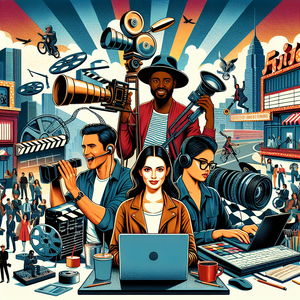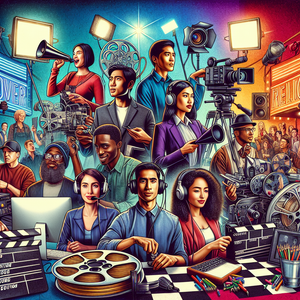
Exploring 21 Exciting Careers in the Film Industry: Roles, Opportunities, and Market Trends
The film industry is a dynamic realm that presents a multitude of career options, spanning both creative and technical fields. Each role is vital to the filmmaking process, contributing uniquely to the final product. With a growing market and a variety of stable job opportunities, individuals interested in film can chart diverse paths toward success. This guide offers insights into in-demand career roles, detailing job descriptions, necessary qualifications, and industry trends, while also providing practical advice for those eager to enter this captivating field.
Job Summaries:
Production Designer:
- Production designers are responsible for creating the visual style of a film.
- They work closely with the director and cinematographer to develop set designs that convey the film's story.
- A background in art, design, or architecture is essential.
- Strong communication skills are important.
- Proficiency in design software is required.
Sound Designer:
- Sound designers are tasked with creating the auditory landscape of a film.
- This includes sound effects and dialogue mixing.
- Typically requiring a degree in sound engineering.
- This role demands expertise in audio editing software.
- An acute attention to detail is necessary.
Film Editor:
- Film editors piece together raw footage into a coherent story during post-production.
- They collaborate with directors to ensure the final film aligns with the intended vision.
- A degree in film or video production is beneficial, alongside proficiency in editing software like Adobe Premiere.
Cinematographer:
- Cinematographers are responsible for capturing the film's visual narrative through camera work and lighting.
- A solid understanding of photography and lighting techniques is a must.
- Often supported by a degree in film studies.
Production Assistant (PA):
- Production assistants are the entry-level backbone of film productions.
- They provide support across various departments.
- A high school diploma is generally sufficient.
- A background in film can be advantageous.
Assistant Director (AD):
- Assistant directors orchestrate production schedules and coordinate the cast and crew.
- This role demands exceptional organizational skills and effective communication.
Script Supervisor:
- Script supervisors maintain continuity during filming.
- Ensuring that every scene aligns with the script.
- A keen eye for detail is essential.
- Strong organizational abilities are essential.
Line Producer:
- Line producers manage the budget and day-to-day operations of film projects.
- This role requires strong financial skills and organizational expertise.
Art Director:
- Art directors collaborate with production designers to oversee visual elements.
- They oversee set design.
- A background in fine arts or design is typically expected.
Visual Effects (VFX) Artist:
- VFX artists create digital effects that enhance footage during post-production.
- Proficiency in software such as Autodesk Maya is crucial.
- A solid understanding of visual effects techniques is important.
Casting Director:
- Casting directors are responsible for selecting actors for roles.
- They review audition tapes and conduct auditions.
- A background in theater or film is often essential.
Gaffer:
- Gaffers lead the lighting team on set
- Responsible for electrical setups
- Technical expertise in lighting equipment is required
Grip:
- Grips handle lighting and rigging equipment
- Require physical stamina
- Require technical understanding
Location Manager:
- Location managers scout and secure filming locations
- Necessitating strong negotiation skills
- Attention to detail
Costumer:
- Costumers design and manage wardrobes.
- Ensuring that clothing aligns with character development.
Scriptwriter:
- Scriptwriters craft narratives for films
- Require exceptional writing skills
- Require creativity
Production Coordinator:
- Production coordinators handle logistics such as scheduling and budgeting.
- Strong organizational skills and prior production experience are crucial.
Documentary Filmmaker:
- Documentary filmmakers create non-fiction films
- Require strong research abilities
- Require storytelling abilities
Marketing Coordinator:
- Marketing coordinators develop strategies to promote films.
- Require strong communication skills.
- Require marketing experience.
Voiceover Artist:
- Voiceover artists lend their voices to characters in various media.
- Strong vocal skills and acting experience are beneficial.
Animation Director:
- Animation directors oversee the creative direction of animated projects
- They necessitate expertise in animation techniques
- They require a strong artistic vision
By exploring these varied roles, aspiring film professionals can discover career paths that align with their skills and passions while gaining insight into industry demands and opportunities. Job openings in these fields can often be found on popular job boards and industry-specific platforms. Staying informed about trends and advancements will be pivotal for anyone looking to establish a rewarding and stable career in this dynamic industry.
Explore More Jobs

